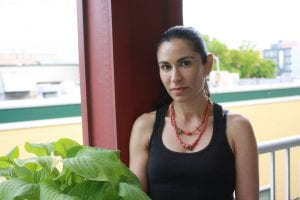María Belén Noroña
… is an Ecuadorian social scientist and educator working at the intersection of higher education, grassroots grounded research, and social justice. My research interest includes political ecology, extractive industries (oil and gas), native people and territories, and the intersection of race and gender violence. My interest in decolonizing education and hegemonic development practices have led me into ongoing collaborations with grassroots organizations and NGOs in developing countries, particularly in Ecuador.
I am currently a postdoctoral scholar at the Center for Environmental Futures (CEF) in the University of Oregon. And I am also co-founder and research coordinator at the Pachaysana Institute. My research as a postdoctoral scholar explores race and processes of territorialization in the context of oil extraction, racism and Covid-19, and indigenous epistemic violence. My work with the Pachaysana Institute is done in collaboration with grassroots rural and indigenous communities in Ecuador, this work is aimed at the production of educational and methodological tools that explore racial and gender violence based on indigenous and rural needs, logics, and epistemologies. Thus, the production of educational methodologies and knowledge is done as a collaborative and collective effort to empower subaltern knowledges.
My teaching methods combine formal classroom lectures with experiential, participatory, and decolonizing learning methods. In this sense, student’s needs, student’s communities, experience, and emotions are relevant aspects for critical thinking and overall engagement with concepts and theory. I have taught courses such as Human Geography, Geography of Latin America, Theories of Development, and Local Stories and Global Trends at the University of Oregon, Beloit College, and the San Francisco University in Quito, Ecuador. My courses tend to include projects that encourage students to engage with real needs and problems in our immediate communities.
I have a book that was published by Abya-Yala and Caap in 2014 featuring indigenous Kichwa participation in the tourism industry in the highlands of Ecuador. My recent work explores collective struggles to access and secure indigenous land in the Journal of Latin America Geography JLAG, and a forthcoming chapter explaining indigenous cartography in the Routledge Handbook of Geospatial Technology, a handbook edited by Doug Specht and Alexander Kent.

